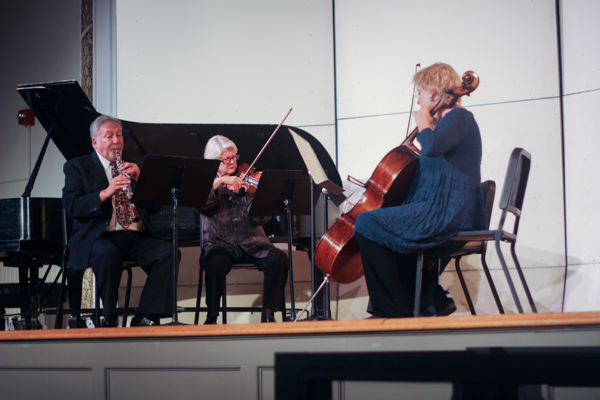

On Tuesday, Sept. 9 at 8 p.m., the Department of Music held its annual Faculty Showcase Concert at the Studley Theatre. The event is the first of a series of concerts held throughout the school year.
A variety of faculty and members are chosen to perform, according to Deputy Chair and Associate Professor Joël Evans, “We present a broad spectrum of chamber music as well as new and unique works,” he said.
An example of this was the work, “Jazz Sketches for Cello and Vibraphone” by David Jarvis, performed by Susan Seligman on cello and Chris Earley on vibraphone.
“I’m delighted to play this piece because it makes me appear a lot cooler than I actually am,” Seligman, lecturer for the music department, said before playing.
Numerous supportive students sat among the crowd.
“We treat the Faculty Showcase as an opportunity for students to meet their music professors as world class artists and performers,” Evans said.
Ruthanne Schempf has been an adjunct professor in the music department at SUNY New Paltz for 19 years. She has participated in and seen many showcases. Schempf recognizes the importance of her students seeing her perform.
Schempf and Evans began the evening with “Sonata for Oboe and Piano” by Francis Poulenc. Schempf played piano and Evans was on oboe. Schempf has been playing piano since she was a child and plays the organ as well.
Schempf said she performs often outside of New Paltz. She is part of a small community concert series in her town of Cornwall, New York where they put on a variety of shows each year. Schempf sometimes performs as a soloist but usually performs with a group.
Assistant Professor Alex Peh also performed in the showcase. He played piano and did two solo performances entitled “Préludes, Deuxieme Livre” by Claude Debussy and “Troisieme Ordre XVIII” by François Couperin.
This is Peh’s second year at SUNY New Paltz and he said he loves it here. He too sees the value in the annual showcase, though it makes him nervous to perform in front of his students.
“Bringing classical music to students who wouldn’t normally listen to it is extremely important,” Peh said.
